| 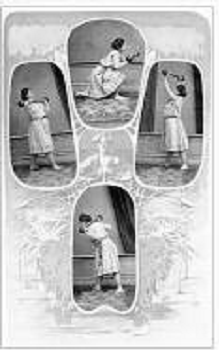
| Die Frau
als Hausärztin |
| Wikipedia | | Alternative medicine and reform strategies
made Anna Fischer-Dückelmann a most controversial, notorious, and
widely read women doctor before World War I, Paulette Meyer, english |
| PDF
|
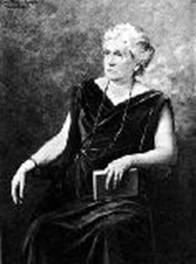
Anna
Fischer-Dückelmann kam 1913 auf den Monte Verità, erwarb
dort Grundstück und Haus. Sie war die bekannteste Naturärztin
ihrer Zeit, eine Pionierin in diesem Feld. Ihr tausendseitiges Buch
‚Die Frau als Hausärztin’ war ein Bestseller,
erschien in Millionen-Auflagen, und stand, wie es heißt, in
jedem zweiten Haushalt. Schon 1914 waren ihre Schriften in 13
Sprachen übersetzt. Dabei hatte sie erst mit 33 Jahren, als
Mutter von drei Kindern, mit dem Studium der Medizin begonnen.
Ziel
ihres Buches
war, die Frauen und Mütter von der Schulmedizin und von den
Ärzten überhaupt möglichst unabhängig zu machen.
Sie bot damit erstmals speziell den Frauen ein Grundwissen in
Naturheilkunde und Sexualaufklärung und damit ein Stück
Emanzipation. Nicht männliche Ärzte, Ärztinnen 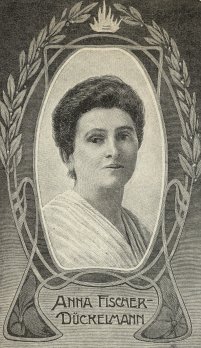 sollten
die Frauen behandeln. Eine gesunde Lebensweise ohne Fleisch, Alkohol
und Nikotin sollte viele Krankheiten erst gar nicht aufkommen
lassen. Schon um 1900 hatte sie, zusammen mit Karl Wilhelm
Diefenbach und der
Pazifistin Bertha von Suttner in der Zeitschrift ‚Der Neue
Mensch’ des Naturpredigers Johannes Guttzeit geschrieben. Guttzeit war um die selbe Zeit einer der Lehrmeister von Gusto
Gräser. Es versteht sich, dass die aufgeklärte Naturheilerin von der etablierten männlichen Schulmedizin als
„Quacksalberin“ und „Krebsgeschwür“ angefeindet wurde. Dass Gusto Gräser die Mitkämpferin Dückelmann
aufgesucht hat, ist wahrscheinlich sollten
die Frauen behandeln. Eine gesunde Lebensweise ohne Fleisch, Alkohol
und Nikotin sollte viele Krankheiten erst gar nicht aufkommen
lassen. Schon um 1900 hatte sie, zusammen mit Karl Wilhelm
Diefenbach und der
Pazifistin Bertha von Suttner in der Zeitschrift ‚Der Neue
Mensch’ des Naturpredigers Johannes Guttzeit geschrieben. Guttzeit war um die selbe Zeit einer der Lehrmeister von Gusto
Gräser. Es versteht sich, dass die aufgeklärte Naturheilerin von der etablierten männlichen Schulmedizin als
„Quacksalberin“ und „Krebsgeschwür“ angefeindet wurde. Dass Gusto Gräser die Mitkämpferin Dückelmann
aufgesucht hat, ist wahrscheinlich
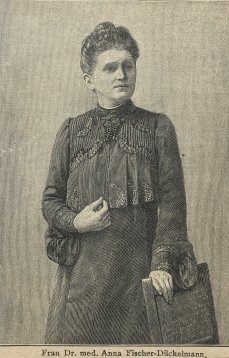 aber nicht belegbar. Er kam 1911
im Pferdewagen mit seiner Familie nach Dresden, wo Fotoaufnahmen
gemacht wurden. 1925/26 wohnte er in der Nähe des Dresdner
Hauses von Fischer-Dückelmann, dem sogenannten „Artushof“ in
Loschwitz. Die Tochter der Naturärztin setzte damals deren
publizistische Arbeit in aufopferungsvoller Weise fort.
Möglicherweise war es Gräser, der Anna Fischer zum Monte
Verità gelockt hat. aber nicht belegbar. Er kam 1911
im Pferdewagen mit seiner Familie nach Dresden, wo Fotoaufnahmen
gemacht wurden. 1925/26 wohnte er in der Nähe des Dresdner
Hauses von Fischer-Dückelmann, dem sogenannten „Artushof“ in
Loschwitz. Die Tochter der Naturärztin setzte damals deren
publizistische Arbeit in aufopferungsvoller Weise fort.
Möglicherweise war es Gräser, der Anna Fischer zum Monte
Verità gelockt hat.
In Ascona
betätigte sich Anna Fischer-Dückelmann im Sanatorium von
Oedenkoven als Ärztin und Wirtschaftsleiterin. Sie lockerte die
strengen Diätregeln und hoffte damit dem schwächelnden
Unternehmen wieder Auftrieb zu geben, blieb aber ohne Erfolg. Sie zog
sich bald wieder vom Sanatorium zurück, widmete sich im Krieg
besonders der Verwundetenpflege und starb 1917 auf dem Monte Verità.
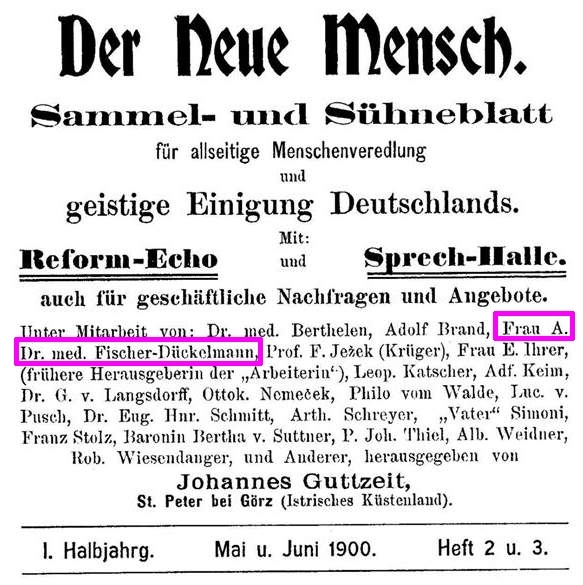
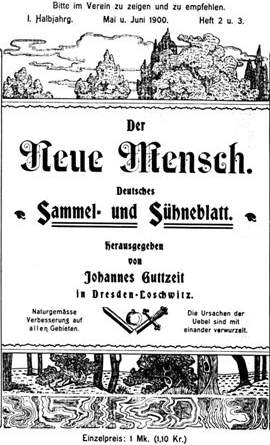
|
Anna Fischer-Dückelmann als Modell
für die Locarneser Malerin
Clara Wagner-Grosch
The woman artist who drew the model from
life positioned the gymnast’s arm in front of
her face to provide anonymity. The signature of this
artist, Clara Wagner Grosch, included a notation that the portrait
was
done in Locarno. This was the
Italian Swiss city near the life-reform
colony of Ascona
where Fischer-Dückelmann worked from time to
time
as consulting
physician and vegetarian diet advisor. (85) In posing as her
own “healthy
woman” model, the physician would only be continuing
to draw upon
her own personal experiences, as she had testified to
doing in other
publications when giving other women preventative
hygiene advice.
When Fischer-Dückelmann recommended, for
example, that cities be
built so that
inhabitants could enjoy the greenery of gardens and trees,
she was
describing the type of suburb outside Dresden
where her family
lived in 1911.
Bad air, sleep-disrupting noises, and poor nutrition in
crowded city
tenements would be mitigated when all districts were
planned as such
“garden cities,” (86) she suggested; and poor, as well as
wealthy, families
needed to get back in touch with more natural environments,
including plants and
animals. The author was optimistic
enough to suggest
that the future would bring improvements even as
she criticized
contemporaries as being out of touch with the best in
ancient and rural
traditions.
While the physician criticized the
wealthier classes for lacking physical
exercise and for
being overly fed and poorly nourished by the rich food called in Germany das
gute Essen,
she also pointed out that women
of the impoverished working classes lacked
both nutritious food and
adequate rest while they worked first outside at
jobs and afterwards
inside the home serving their husbands and
families. Fischer-Dückelmann believed such women should be provided
vacations at rest homes
to recover while working class men who
laboured for 12-hour days also
needed more time for rest and recovery. (p.172)
Aus:
Physiatrie
and German Maternal
Feminism:
Dr. Anna Fischer-Dückelmann
Critiques Academic
Medicine:
PAULETTE
MEYER
Abstract. Alternative
medicine and reform strategies made Anna Fischer-Dückelmann a most controversial, notorious, and widely read women doctor before
World
War I. She published a dozen titles in 13
languages asserting that national
well-being depended on maternal prowess. To her critics, Fischer-Dückelmann’s
commitment to medical self-help and practices of Physiatrie amounted to medical quackery. Her career has been largely unexamined, yet her feminist
critiques
and social concerns are not far removed from modern social medicine. For
this
pioneering doctor, treating physical and emotional ills and promoting the health
of families were first steps toward healing the divisions of a world at
war.
Résumé. Les
approches alternatives et réformistes du docteur Anna Fischer-Dückelmann ont fait d’elle
une personne controversée, connue et beaucoup
lue
dans les années qui ont précédé la Première Guerre Mondiale. Elle a en
effet
publié une douzaine d’ouvrages, qui ont été traduits dans 13 langues,
dans
lesquels elle soutenait que la santé, au niveau national, dépendait avant
tout
des mères. Aux yeux de ses critiques, sa foi dans l’automédication et dans
la
« physiatrie » relevait du charlatanisme. Sa carrière a été peu étudiée
jusqu’ici,
mais
il ressort que plusieurs de ses approches féministes et de ses préoccupations
sociales n’étaient pas très éloignées de ce qui caractérise aujourd’hui la
médecine
sociale. Pour cette femme-médecin pionnière, le traitement des maladies
et la promotion de la santé des familles constituaient les premiers pas
vers
la réconciliation de mondes en guerre.
Paulette Meyer,
PhD, Portland, Oregon.
“Maternal feminism” and “physiatrie” are terms
that describe Fischer-Dückelmann’s ideological standpoints. Maternal feminism refers
to her advocacy of women physicians to treat women, a stance that
placed her in conflict with much of the male medical establishment. She
defined physiatrie as the practice of healthful diet and lifestyle to prevent
disease. In her mind these included a vegetarian diet and abstinence
from alcohol, not especially popular notions in Imperial Germany. As a
contemporary of Franziska Tiburtius, Fischer-Dückelmann’s curiosity
and open-mindedness to alternative theories of treatment were condemned by many professional colleagues. This was not the type of attention sought by most women physicians. Just five years after Dr. Tiburtius’s Canadian message, the prestigious German medical journal
Münchener Medizinische
Wochenschrift published in July 1914 a disclaimer from an editor of a new medical publication called Dia. The irate
editor, Dr. Adolf Braun, claimed that an announcement in his first issue
advertising Frau Dr. Fischer-Dückelmann’s books was hidden in a location where he was not able to read it until after publication. He opposed
the woman physician’s works as quackery and vowed to remove future
reference to her books in order to preserve the purity of his “physician-loyal” publication. If it were not possible to avoid paid advertisements of
such quack medicine, he would certainly resign as editor of Dia. By the
time Braun’s disclaimer was published, Fischer-Dückelmann had sold
over a million copies of her publications, which may have made her
unpopular with less successful colleagues and literary competitors. In
1910,
when another woman physician, Jenny Springer (MD Zürich,
1897),
published her own medical guidebook (The
Woman Doctor of the
House), reviewers expressed the wish that this
publication would displace the “lamentably wide popularity of the books by F…D…” linking
Fischer-Dückelmann
to the “cancerous spread of quackery.”
Physiatrie and German Maternal Feminism
147
By
1914 Anna Fischer-Dückelmann had published
a dozen popular
medical titles translated into 13 languages, including English. Combining
simple explanations of current medical knowledge with descriptions of
alternative or traditional medical practices, she gained the admiration of
her lay audience and the censure of many professional peers. Her 1000-page medical advice book sold over a million copies in German alone in
its first 12 years of publication. She instructed nursing students in Dresden, Germany,
taught home nursing skills to international students in
Switzerland, and also practised medicine at health spas where she
demonstrated dietary modifications and participated in gymnastic training and water therapies along with her students and patients. Integrating popular healing traditions into academic medicine made her reputation among medical reformers in Europe and North
America.
Her
personal perspectives were that of an outsider, first of all, as a
woman physician in a country that had long refused to allow females to
take medical certification examinations. She was also an Austrian immigrant to Imperial Germany and she earned her medical degree over the
border in Switzerland.
Fischer-Dückelmann moved in from the margins
of her society—to use bell hook’s characterisation —and asserted a
maternal feminist authority to refashion the German men’s medical profession. Feminist Hedwig Dohm had responded to the patronizing attitude of many German physicians: “What if…indeed women were indiscriminately sick, sick; nothing but a great wound in the universe; and we
poor invalids in spite of ourselves would really do best—as the wounded
animal creeps into a thicket—to vanish within the nursery, the bed-chamber, the lying-in chamber, giving ourselves up solely to the culture
of our sex-functions.”
The
patriarchal characterization of women is
what prompted Anna
Fischer-Dückelmann
to earn a medical degree
and publish information that women and their families might use to
counter such views.
Physiatrie and German Maternal
Feminism
149
(Im Internet)
|
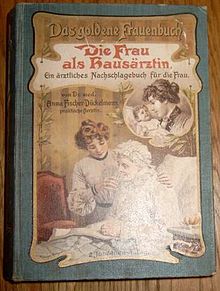


 sollten
die Frauen behandeln. Eine gesunde Lebensweise ohne Fleisch, Alkohol
und Nikotin sollte viele Krankheiten erst gar nicht aufkommen
lassen. Schon um 1900 hatte sie, zusammen mit Karl Wilhelm
Diefenbach und der
Pazifistin Bertha von Suttner in der Zeitschrift ‚Der Neue
Mensch’ des Naturpredigers Johannes Guttzeit geschrieben. Guttzeit war um die selbe Zeit einer der Lehrmeister von Gusto
Gräser. Es versteht sich, dass die aufgeklärte Naturheilerin von der etablierten männlichen Schulmedizin als
„Quacksalberin“ und „Krebsgeschwür“ angefeindet wurde. Dass Gusto Gräser die Mitkämpferin Dückelmann
aufgesucht hat, ist wahrscheinlich
sollten
die Frauen behandeln. Eine gesunde Lebensweise ohne Fleisch, Alkohol
und Nikotin sollte viele Krankheiten erst gar nicht aufkommen
lassen. Schon um 1900 hatte sie, zusammen mit Karl Wilhelm
Diefenbach und der
Pazifistin Bertha von Suttner in der Zeitschrift ‚Der Neue
Mensch’ des Naturpredigers Johannes Guttzeit geschrieben. Guttzeit war um die selbe Zeit einer der Lehrmeister von Gusto
Gräser. Es versteht sich, dass die aufgeklärte Naturheilerin von der etablierten männlichen Schulmedizin als
„Quacksalberin“ und „Krebsgeschwür“ angefeindet wurde. Dass Gusto Gräser die Mitkämpferin Dückelmann
aufgesucht hat, ist wahrscheinlich
 aber nicht belegbar. Er kam 1911
im Pferdewagen mit seiner Familie nach Dresden, wo Fotoaufnahmen
gemacht wurden. 1925/26 wohnte er in der Nähe des Dresdner
Hauses von Fischer-Dückelmann, dem sogenannten „Artushof“ in
Loschwitz. Die Tochter der Naturärztin setzte damals deren
publizistische Arbeit in aufopferungsvoller Weise fort.
Möglicherweise war es Gräser, der Anna Fischer zum Monte
Verità gelockt hat.
aber nicht belegbar. Er kam 1911
im Pferdewagen mit seiner Familie nach Dresden, wo Fotoaufnahmen
gemacht wurden. 1925/26 wohnte er in der Nähe des Dresdner
Hauses von Fischer-Dückelmann, dem sogenannten „Artushof“ in
Loschwitz. Die Tochter der Naturärztin setzte damals deren
publizistische Arbeit in aufopferungsvoller Weise fort.
Möglicherweise war es Gräser, der Anna Fischer zum Monte
Verità gelockt hat.
